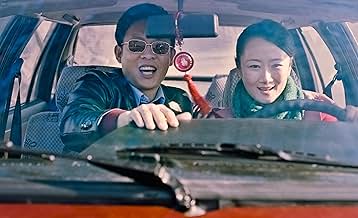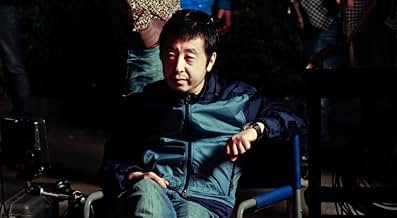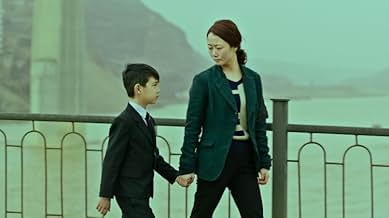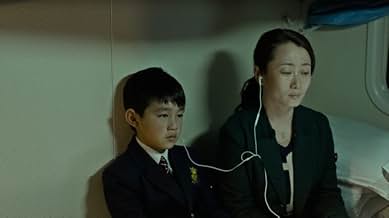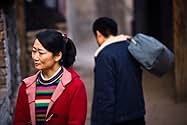NOTE IMDb
6,9/10
6,8 k
MA NOTE
La vie de Tao et de ses proches est explorée à travers trois périodes différentes : 1999, 2014 et 2025.La vie de Tao et de ses proches est explorée à travers trois périodes différentes : 1999, 2014 et 2025.La vie de Tao et de ses proches est explorée à travers trois périodes différentes : 1999, 2014 et 2025.
- Réalisation
- Scénario
- Casting principal
- Récompenses
- 26 victoires et 42 nominations au total
Yi Zhang
- Zhang Jinsheng
- (as Zhang Yi)
Zijian Dong
- Zhang Daole aka Dollar
- (as Dong Zijian)
Avis à la une
For the most part, this is a beautifully written movie. The direction and acting are excellent throughout. The writing is too. although the sequence set in Australia is rather unnecessary. I have read reviews saying they found this sequence awkward. it is mostly in English. I didn't find it awkward. It just didn't bring anything to the movie. We could have been spending more time with the wonderful Tao Zhao. As I said all the performances are excellent. But it's her's you will remember, and the film does end perfectly
Reading the reviews, you might suspect this to be a sophisticated, political film. You couldn't be more wrong: there's nothing sophisticated about it, it's about a heart that breaks over time.
The story follows a woman, and two men from different social status (a mine worker and a director), who both love her. Eventually she has to decide for one of them, but as time goes by, she wonders whether she made the right choice or not. Told over a time span of 25 years, the film shows like few others how time changes our society, affects the private lives of individuals. Especially the last part set in 2025 is masterfully done, it could have turned out sophisticated, instead it hits right into the heart.
The film says that things like social status and language do change our daily lives, and those changes can never be undone again.
The usage of the movie format is genius (even more then in Xavier Dolan's 'Mommy'), it tells us, that even though the future broadens our perspective, it also makes us lose focus of what is truly essential to live a happy life.
I have watched a ton of great movies in my life. This one takes the cake for most heartbreaking ending of all time. There are no words to describe it.
The story follows a woman, and two men from different social status (a mine worker and a director), who both love her. Eventually she has to decide for one of them, but as time goes by, she wonders whether she made the right choice or not. Told over a time span of 25 years, the film shows like few others how time changes our society, affects the private lives of individuals. Especially the last part set in 2025 is masterfully done, it could have turned out sophisticated, instead it hits right into the heart.
The film says that things like social status and language do change our daily lives, and those changes can never be undone again.
The usage of the movie format is genius (even more then in Xavier Dolan's 'Mommy'), it tells us, that even though the future broadens our perspective, it also makes us lose focus of what is truly essential to live a happy life.
I have watched a ton of great movies in my life. This one takes the cake for most heartbreaking ending of all time. There are no words to describe it.
When everybody around me liked the director's previous film 'A Touch of Sin', I didn't. As a film fanatic, reject such kind of film is not an easy job without giving a proper reason. I thought that was a missed opportunity. I surely like art films, not the boring one like those aimlessly narrated. I really loved some of the scenes there, but here it was completely different. Most importantly, anybody would understand what the film is trying to say without trying too hard.
This is a theme where the China's rise was revealed from the three people's personal life perspective that was categorised to the three generations or the timelines. That's not it, the communism was also highlighted, how it held back the people's freedom. The writer was really smart to smoothly disclosing that to the world. I mean the film never dragged the China's ruling party or its system, but all were told from its character who struggled and if you use your brain, you will get it why.
The narration was divided into three episodes. The first one takes place in the year 1999, in a small town somewhere in the China which is economically backward. The story follows a young woman named Tao, who is caught in a love triangle. But for the practical reason, she has to choose one of them and when she does, the other guy leaves the town with the heartbroken. This is the foundation, that dragged for nearly 40 minutes. Obviously slow, but very realistic approach.
I grew up in the 90s, my country was not much different than what's in this film was shown. So I liked the atmosphere, all those the 90s set, the automobiles, lifestyle, the landscapes of the small towns et cetera taken me back to that time. But the thing is, it was China, society and culturally different. Anyway, it was past and what follows are totally flips the narration, including the perspective.
"You know the hardest thing, about love is caring."
The second episode takes place in the year 2014, which is something like the present. It reveals what's the status of all the main three characters, like where they're economically standing and the personal life struggles. Tao's married life did not go well and her son is around ten years old who visits her from Shanghai. The one who left the town is now returned and battling for his life for some reason.
In the last 15 years, the China significantly changed and still, this entire part is set in the same town which is now economically moved forward. Like the changing urban landscape, how these characters too changed were what focused on this section.
Then comes the final episode where it is now in the year 2025, that takes place somewhere in the Australia. The perspective was changed, the little boy is now in his 20s, seems lost is root. With his behaviour, you would notice that his lack of knowledge about his ancestors. He who has the differences with his father, decides to make his life as he wanted. That is why the parents should take responsibility to teach their children all the good things about their culture and traditions, and to carry on, it's up to them. Because losing one's identity could lead to the failures in the life.
This is the part I liked better. Because it was something like what I encountered in my life. Most of the childhood memories that returns after we're grown-up as the deja vu, like the history repeating itself. Here for pointing out the freedom one to buy a gun was indirectly hit the communism. I mean gun was not a threat, it was just an expressed how it affects people in all the similar circumstances. I meant, what something was hidden brings more eagerness for us to know about it than those are in the out. So forcing something on people is sometime is a bad idea.
All the actors were good, but apart from the slow screenplay, I liked the idea of this film. There are some other similar films, like how different generations behave and now this is among them, yet not the best out of all of them. Very much watchable, only if you are capable of handling slow drag. If you know this director very well or the fan of his works, you will find it a pretty interesting film. I won't recommend it, but I also won't either suggest you to skip it.
7.5/10
This is a theme where the China's rise was revealed from the three people's personal life perspective that was categorised to the three generations or the timelines. That's not it, the communism was also highlighted, how it held back the people's freedom. The writer was really smart to smoothly disclosing that to the world. I mean the film never dragged the China's ruling party or its system, but all were told from its character who struggled and if you use your brain, you will get it why.
The narration was divided into three episodes. The first one takes place in the year 1999, in a small town somewhere in the China which is economically backward. The story follows a young woman named Tao, who is caught in a love triangle. But for the practical reason, she has to choose one of them and when she does, the other guy leaves the town with the heartbroken. This is the foundation, that dragged for nearly 40 minutes. Obviously slow, but very realistic approach.
I grew up in the 90s, my country was not much different than what's in this film was shown. So I liked the atmosphere, all those the 90s set, the automobiles, lifestyle, the landscapes of the small towns et cetera taken me back to that time. But the thing is, it was China, society and culturally different. Anyway, it was past and what follows are totally flips the narration, including the perspective.
"You know the hardest thing, about love is caring."
The second episode takes place in the year 2014, which is something like the present. It reveals what's the status of all the main three characters, like where they're economically standing and the personal life struggles. Tao's married life did not go well and her son is around ten years old who visits her from Shanghai. The one who left the town is now returned and battling for his life for some reason.
In the last 15 years, the China significantly changed and still, this entire part is set in the same town which is now economically moved forward. Like the changing urban landscape, how these characters too changed were what focused on this section.
Then comes the final episode where it is now in the year 2025, that takes place somewhere in the Australia. The perspective was changed, the little boy is now in his 20s, seems lost is root. With his behaviour, you would notice that his lack of knowledge about his ancestors. He who has the differences with his father, decides to make his life as he wanted. That is why the parents should take responsibility to teach their children all the good things about their culture and traditions, and to carry on, it's up to them. Because losing one's identity could lead to the failures in the life.
This is the part I liked better. Because it was something like what I encountered in my life. Most of the childhood memories that returns after we're grown-up as the deja vu, like the history repeating itself. Here for pointing out the freedom one to buy a gun was indirectly hit the communism. I mean gun was not a threat, it was just an expressed how it affects people in all the similar circumstances. I meant, what something was hidden brings more eagerness for us to know about it than those are in the out. So forcing something on people is sometime is a bad idea.
All the actors were good, but apart from the slow screenplay, I liked the idea of this film. There are some other similar films, like how different generations behave and now this is among them, yet not the best out of all of them. Very much watchable, only if you are capable of handling slow drag. If you know this director very well or the fan of his works, you will find it a pretty interesting film. I won't recommend it, but I also won't either suggest you to skip it.
7.5/10
Mountains May Depart starts on perhaps my favourite opening shot of the year. Kicking it off with the Pet Shop Boys' vibrant song "Go West," we're straight in the middle of a dance routine with a room full of people clumsily bopping in sync. It's infectious and filled with unbridled hope and joy. Unfortunately, it's downhill from here, though the film is never aiming for the same type of exuberance. I'm not familiar with Jia Zhangke or his following – Walter Salles apparently has a hotly anticipated documentary about the director at this festival – but Mountains May Depart seems like an endearing and accessible introduction. Telling three stories in three separate time periods, I do enjoy the way it explores causality in how these small relationships and dramas at one time can feed into a dilemma 25 years later.
The first story, set during the turn of the century in 1999 when Chinese capitalism was healthy, follows a love triangle between Tao, an aerobics instructor, Zhang, an egotistic entrepreneur, and Liangzi, a man who works for Zhang. The three hang out as friends but Zhang can't bear the idea of Tao getting close to Liangzi and despite emotional logic, it's social economical pressures that make decisions. Cut to 2014, Tao and her beau have divorced and she's now estranged from her son. Upon the death of her father, her son is forced to visit and she must make the decision of how connected she should be to him throughout his life. Then off to an imagined Australia in 2025, her son doesn't remember her and currently struggles with his relationship with his father where they now have a language barrier. With the help of a teacher he grows attached to, he goes in search for Tao.
Each section of the film is approached in a different way, reminiscent of the way last year's The Grand Budapest Hotel and Mommy played with ratios. The first section is a tight 4:3, the second is a full frame, and the third is widescreen. However, these feel like they represent the period and the environment moreso than the character's emotions, with exception to the mid- section, which ideally captures Tao's regret and longing. It's a mixed bag depending on the talent, with some tender moments landing strong and some clumsily misguided, the latter most prominent in the last section. That first section has a bait and switch for the decades long heartache that the seemingly innocent love triangle causes. The theme of how people drift apart no matter how close they are resonates but it's unbearably melancholic without Zhangke offering much of a satisfying a silver lining.
It's a shame that despite the film's strengths it has too many loose ends and unnecessary moments that don't appear to add to the character arcs or the themes. With a 25 year story like this where no single character carries us through the whole film, every moment has to count to something. There's little justification as to why the third section is in glorious widescreen and set in Australia, but perhaps this just speaks to how disconnected it is from the rest of the film. While mostly drenched in Chinese culture, I wish Zhangke didn't resort to certain American clichés such as sad montages of characters having deep thoughts set to music. However, with those time gaps, Zhangke does harness a powerful nostalgic through just a few song motifs carried through all three sections that are well executed. Both disarmingly simple and complex, his ambition is admirable, but it doesn't quite reach the potential that this expanse allows it to travel.
7/10
Read more @ The Awards Circuit (http://www.awardscircuit.com/)
The first story, set during the turn of the century in 1999 when Chinese capitalism was healthy, follows a love triangle between Tao, an aerobics instructor, Zhang, an egotistic entrepreneur, and Liangzi, a man who works for Zhang. The three hang out as friends but Zhang can't bear the idea of Tao getting close to Liangzi and despite emotional logic, it's social economical pressures that make decisions. Cut to 2014, Tao and her beau have divorced and she's now estranged from her son. Upon the death of her father, her son is forced to visit and she must make the decision of how connected she should be to him throughout his life. Then off to an imagined Australia in 2025, her son doesn't remember her and currently struggles with his relationship with his father where they now have a language barrier. With the help of a teacher he grows attached to, he goes in search for Tao.
Each section of the film is approached in a different way, reminiscent of the way last year's The Grand Budapest Hotel and Mommy played with ratios. The first section is a tight 4:3, the second is a full frame, and the third is widescreen. However, these feel like they represent the period and the environment moreso than the character's emotions, with exception to the mid- section, which ideally captures Tao's regret and longing. It's a mixed bag depending on the talent, with some tender moments landing strong and some clumsily misguided, the latter most prominent in the last section. That first section has a bait and switch for the decades long heartache that the seemingly innocent love triangle causes. The theme of how people drift apart no matter how close they are resonates but it's unbearably melancholic without Zhangke offering much of a satisfying a silver lining.
It's a shame that despite the film's strengths it has too many loose ends and unnecessary moments that don't appear to add to the character arcs or the themes. With a 25 year story like this where no single character carries us through the whole film, every moment has to count to something. There's little justification as to why the third section is in glorious widescreen and set in Australia, but perhaps this just speaks to how disconnected it is from the rest of the film. While mostly drenched in Chinese culture, I wish Zhangke didn't resort to certain American clichés such as sad montages of characters having deep thoughts set to music. However, with those time gaps, Zhangke does harness a powerful nostalgic through just a few song motifs carried through all three sections that are well executed. Both disarmingly simple and complex, his ambition is admirable, but it doesn't quite reach the potential that this expanse allows it to travel.
7/10
Read more @ The Awards Circuit (http://www.awardscircuit.com/)
Finally caught up Jia's latest film in the cinema during my sojourn in China, more than one month after its national theatrical release, quite a long-run if you are familiar with China's booming but money-seeking film market, an art house feature can barely survive even for one week if attendance fails to hold up. Also notably it is his first theatrical release in China after 24 CITY (2008).
MOUNTAINS MAY DEPART forms a ternary narrative within 3 different time-span with an ever- wider Aspect Ratio (1.37:1, 1.85:1 and 2.35:1). The first chapter is in 1999, in a Northern east industrial town, on the eve of the millennium, audience is invited to participate in a love-triangle among Tao (Zhao) and her two childhood friends Jinsheng (Zhang) and Liangzi (Liang), the stability of a harmonious triangle (Chinese are too materialistic and selfish to even have the gut to attempt the enticing romanticism epitomised half-an-century ago in JULES AND JIM, 1962) disintegrates when men's possession comes to the fore. Oscillating between a colliery upstart and a destitute coal-miner, Tao's eventual choice is perfectly legitimate if put oneself in her shoes, we might most likely make the same decision - a future capitalist is far superior than a working-class honest man. Then Jia's trademark metaphorical injection of a crashing seeder becomes the harbinger of a downcast future for Tao and at the end of first chapter, the title card belatedly appears on the screen, "山河故人", its literal translation should be "mountain, river and old friend".
The second chapter fast-forwards 15 years to the present, in 2014, Liangzi returns to hometown with his wife and their child, suffering from undisclosed disease due to long-term hard labor, he is desperate to borrow money for his medical treatment, and Tao is his last resort. Divorced from Jinsheng, who has remarried and moved to Shanghai with their son Daole (homophonous to dollar), the forty-year-old Tao is a successful business woman owns a petrol company. Ironically it is also money, which has destroyed their rapport in the first place, finally mends their broken friendship, but also tragically shoves them drift farther away, leaving both a wistful aftertaste. Only so much for Liangzi, who will be left out altogether in the following story. A family funeral reunites Tao and an eight-year-old Daole (Rong) for a couple of days, but the gaping physical distance is too detrimental to shape an intimate mother-son connection, before leaving, Tao leaves him a key to remind him there will always be a home for him.
The final chapter sets in the near future, in 2025, Daole (Dong), now a college student living in Australia with Jinsheng, experiences the Oedipus complex in the most impressionable age, aggravated by the strained relationship with his father (encapsulated by the language barrier), a lost sense of belonging, and the vague memory of his birth mother, he develops a may-December romance with his Chinese teacher Mia (Chang), a middle-aged divorcée. Home is calling, but Jia leaves an open ending, it ends with Tao dancing to Pet Shop Boys' GO WEST in the snow-land, completes a formative salute to the opening dancing sequence, the same song, 26 years apart.
MOUNTAINS MAY DEPART tellingly marks that Zhangke Jia has transitioned to a new phase of filmmaking, less pungent (but not less insightful) in his social commentary but more aware of a film's holistic overview, it is also the first time in his works he creates a future scenario, although the third part is the weakest link, it is a step of trying something out of his comfort zone, where he masterly applies Sally Yeh's TAKE CARE, a Cantonese song from 1990, as a recurring motif to extract an air of undissipated melancholia. His script always finds its root in reality and excellently proffers a generous platform for its cast to portray various characters, Tao Zhao, Jia's wife and muse, delineates a demanding role ranging across almost three decades beautifully and compassionately, and Yi Zhang is the scene-stealing object of ridicule as a shallow parvenu, the excrescence of China's unbalanced development.
In a nutshell, MOUNTAINS MAY DEPART can't be estimated as the crest among Jia's filmography, but in a promising way, it takes him out of the pigeonhole as an uncompromising social observer and critic, an art-house devotee whose film is solely aiming for western recognition, and signifies his potential to concoct something more eclectic and emotionally abiding.
MOUNTAINS MAY DEPART forms a ternary narrative within 3 different time-span with an ever- wider Aspect Ratio (1.37:1, 1.85:1 and 2.35:1). The first chapter is in 1999, in a Northern east industrial town, on the eve of the millennium, audience is invited to participate in a love-triangle among Tao (Zhao) and her two childhood friends Jinsheng (Zhang) and Liangzi (Liang), the stability of a harmonious triangle (Chinese are too materialistic and selfish to even have the gut to attempt the enticing romanticism epitomised half-an-century ago in JULES AND JIM, 1962) disintegrates when men's possession comes to the fore. Oscillating between a colliery upstart and a destitute coal-miner, Tao's eventual choice is perfectly legitimate if put oneself in her shoes, we might most likely make the same decision - a future capitalist is far superior than a working-class honest man. Then Jia's trademark metaphorical injection of a crashing seeder becomes the harbinger of a downcast future for Tao and at the end of first chapter, the title card belatedly appears on the screen, "山河故人", its literal translation should be "mountain, river and old friend".
The second chapter fast-forwards 15 years to the present, in 2014, Liangzi returns to hometown with his wife and their child, suffering from undisclosed disease due to long-term hard labor, he is desperate to borrow money for his medical treatment, and Tao is his last resort. Divorced from Jinsheng, who has remarried and moved to Shanghai with their son Daole (homophonous to dollar), the forty-year-old Tao is a successful business woman owns a petrol company. Ironically it is also money, which has destroyed their rapport in the first place, finally mends their broken friendship, but also tragically shoves them drift farther away, leaving both a wistful aftertaste. Only so much for Liangzi, who will be left out altogether in the following story. A family funeral reunites Tao and an eight-year-old Daole (Rong) for a couple of days, but the gaping physical distance is too detrimental to shape an intimate mother-son connection, before leaving, Tao leaves him a key to remind him there will always be a home for him.
The final chapter sets in the near future, in 2025, Daole (Dong), now a college student living in Australia with Jinsheng, experiences the Oedipus complex in the most impressionable age, aggravated by the strained relationship with his father (encapsulated by the language barrier), a lost sense of belonging, and the vague memory of his birth mother, he develops a may-December romance with his Chinese teacher Mia (Chang), a middle-aged divorcée. Home is calling, but Jia leaves an open ending, it ends with Tao dancing to Pet Shop Boys' GO WEST in the snow-land, completes a formative salute to the opening dancing sequence, the same song, 26 years apart.
MOUNTAINS MAY DEPART tellingly marks that Zhangke Jia has transitioned to a new phase of filmmaking, less pungent (but not less insightful) in his social commentary but more aware of a film's holistic overview, it is also the first time in his works he creates a future scenario, although the third part is the weakest link, it is a step of trying something out of his comfort zone, where he masterly applies Sally Yeh's TAKE CARE, a Cantonese song from 1990, as a recurring motif to extract an air of undissipated melancholia. His script always finds its root in reality and excellently proffers a generous platform for its cast to portray various characters, Tao Zhao, Jia's wife and muse, delineates a demanding role ranging across almost three decades beautifully and compassionately, and Yi Zhang is the scene-stealing object of ridicule as a shallow parvenu, the excrescence of China's unbalanced development.
In a nutshell, MOUNTAINS MAY DEPART can't be estimated as the crest among Jia's filmography, but in a promising way, it takes him out of the pigeonhole as an uncompromising social observer and critic, an art-house devotee whose film is solely aiming for western recognition, and signifies his potential to concoct something more eclectic and emotionally abiding.
Le saviez-vous
- AnecdotesSome sequences (in the 1999 segment) were filmed by the director and the cinematographer back in 2001.
- GaffesThe young boy who plays Tao's son in 2014 is also part of the crowd of children that watches her perform at the new year's celebrations in 1999.
- Crédits fousThe title appears more than forty minutes after the beginning of the movie.
- Bandes originalesGo West
Written by Henri Belolo, Jacques Morali and Victor Willis, Neil Tennant and Chris Lowe
Performed by Pet Shop Boys
Meilleurs choix
Connectez-vous pour évaluer et suivre la liste de favoris afin de recevoir des recommandations personnalisées
- How long is Mountains May Depart?Alimenté par Alexa
Détails
- Date de sortie
- Pays d’origine
- Site officiel
- Langues
- Aussi connu sous le nom de
- Mountains May Depart
- Lieux de tournage
- Fenyang, Shanxi, Chine(Tao's home town)
- Sociétés de production
- Voir plus de crédits d'entreprise sur IMDbPro
Box-office
- Montant brut aux États-Unis et au Canada
- 82 913 $US
- Week-end de sortie aux États-Unis et au Canada
- 5 550 $US
- 14 févr. 2016
- Montant brut mondial
- 5 215 660 $US
- Durée2 heures 6 minutes
- Couleur
- Mixage
Contribuer à cette page
Suggérer une modification ou ajouter du contenu manquant


